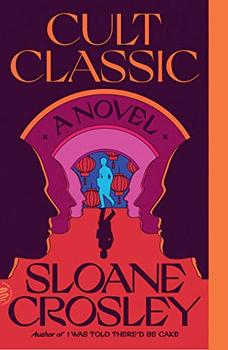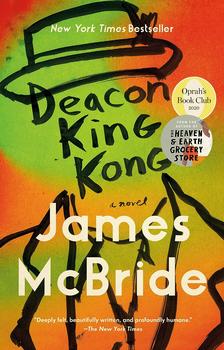Summary | Excerpt | Reviews | Beyond the book | Read-Alikes | Genres & Themes | Author Bio

Danzy Senna has spent virtually her entire writing career exploring the complicated intersections of race, heredity, appearance, and identity. From her first novel, Caucasia (1999)—about two sisters who appear to be of different races—to her memoir, Where Did You Sleep Last Night? (about how her parents' interracial marriage and bitter divorce shaped her identity), she has grappled with these issues in thoughtful, and sometimes painful, ways. Now, in New People, Senna approaches these intersections again, this time also placing her characters in a time and place on the verge of dramatic change.
The place is Brooklyn, and the time is the mid-1990s, 1996 to be exact. At the center of the novel is a couple—Maria and Khalil—about to be married. The two met at Stanford University, and have now settled in Brooklyn, where Maria is completing her dissertation on the ethnomusicology of the Jonestown settlement (see Beyond the Book for more about the settlement). Khalil is teaming up with a friend to start "an online community of like-minded souls, modern tribalism at its best." Khalil is more in love with Brooklyn than Maria is; he's eager to be part of the vanguard of the so-called Brooklyn Renaissance, as multi-hued intellectuals, entrepreneurs, and creative types reclaim this unloved borough and make it their own.
Maria and Khalil are both ethnically ambiguous (they dub one another "King and Queen of the Racially Nebulous Prom"), though their backgrounds couldn't be less alike. Khalil and his sister were raised in an affluent, intellectual hippie family, and Khalil didn't identify as black until college. Maria's adoptive single mother, a black radical feminist, was surprised when the mixed-race baby she adopted always appeared more white than black. For a filmmaker shooting a documentary about the newly diverse Brooklyn, however, Maria and Khalil are the ideal couple, the beautiful "New People" she's been looking to profile.
As Maria faces increasing pressure to decide on details for what seems like her surprisingly conventional wedding, she finds herself feeling not just ethnically ambiguous but ambiguous about everything—her research, her impending marriage, her racial identity. She is drawn to a black poet whose path keeps crossing hers; as she takes increasingly reckless chances to get close to him, her sense of who she is and what she wants seems to grow ever more muddled.
At times, the glimpses into Maria's inner thoughts take readers to some pretty dark and uncomfortable places that will compel readers to confront their own assumptions about race and identity. For example, Maria recalls an incident in college when she made a prank call and a racist joke that was blamed on a white student. One wonders whether and when Maria's actions are conscious choices dictated by appearance or other factors, about whether the "Brooklyn Renaissance" is ushering in a new age of enlightenment or just one of confusion, at least for Maria. Her increasingly fractured present is punctuated by scenes from her past—her childhood with her mother Gloria, her earlier relationship with a white man in college, and the beginnings of her relationship with Khalil—that illustrate her ongoing attempts to define herself, an effort that seems far from settled even at the novel's conclusion. Readers who pick up New People in 2017, more than twenty years after its setting, will recognize both how much Brooklyn, its residents, and the country as a whole have continued to evolve over the intervening decades and how relevant the issues raised in its pages — from gentrification and the creative economy to, more broadly, issues of race and identity — still remain.
![]() This review
first ran in the August 2, 2017
issue of BookBrowse Recommends.
This review
first ran in the August 2, 2017
issue of BookBrowse Recommends.

If you liked New People, try these:

by Sloane Crosley
Published 2023
Hilariously insightful and delightfully suspenseful, Cult Classic is an original: a masterfully crafted tale of love, memory, morality, and mind control, as well as a fresh foray into the philosophy of romance.

by James McBride
Published 2021
From James McBride, author of the National Book Award-winning The Good Lord Bird, comes a wise and witty novel about what happens to the witnesses of a shooting.
A library is thought in cold storage
Click Here to find out who said this, as well as discovering other famous literary quotes!
Your guide toexceptional books
BookBrowse seeks out and recommends the best in contemporary fiction and nonfiction—books that not only engage and entertain but also deepen our understanding of ourselves and the world around us.